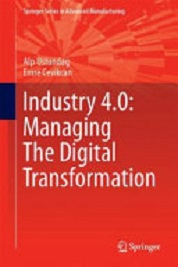Industry 4.0 Managing the Digital Transformation
Material type: TextLanguage: English Series: Springer Series in Advanced ManufacturingPublication details: Cham, Switzerland : Springer, c2018Description: XVIII, 286 p. : illISBN:
TextLanguage: English Series: Springer Series in Advanced ManufacturingPublication details: Cham, Switzerland : Springer, c2018Description: XVIII, 286 p. : illISBN: - 9783319578699
- 670.285 UST
| Item type | Current library | Shelving location | Call number | Copy number | Status | Date due | Barcode |
|---|---|---|---|---|---|---|---|
 Reference Collection
Reference Collection
|
Reference Section | Reference Section | 670.285 UST | 2022-23 | Available | 98000 |
Authors:
• Alp Ustundag ,
• Emre Cevikcan
• Provides a conceptual framework and roadmap for decision-makers for the coming Industry 4.0 transformation
• Discusses both the technological and management aspects of Industry 4.0
• Includes numerous case studies from industry demonstrating how Industry 4.0 technologies are transforming production and manufacturing
Summary"
This book provides a comprehensive guide to Industry 4.0 applications, not only introducing implementation aspects but also proposing a conceptual framework with respect to the design principles. In addition, it discusses the effects of Industry 4.0, which are reflected in new business models and workforce transformation. The book then examines the key technological advances that form the pillars of Industry 4.0 and explores their potential technical and economic benefits using examples of real-world applications. The changing dynamics of global production, such as more complex and automated processes, high-level competitiveness and emerging technologies, have paved the way for a new generation of goods, products and services. Moreover, manufacturers are increasingly realizing the value of the data that their processes and products generate. Such trends are transforming manufacturing industry to the next generation, namely Industry 4.0, which is based on the integration of information and communication technologies and industrial technology.
The book provides a conceptual framework and roadmap for decision-makers for this transformation
